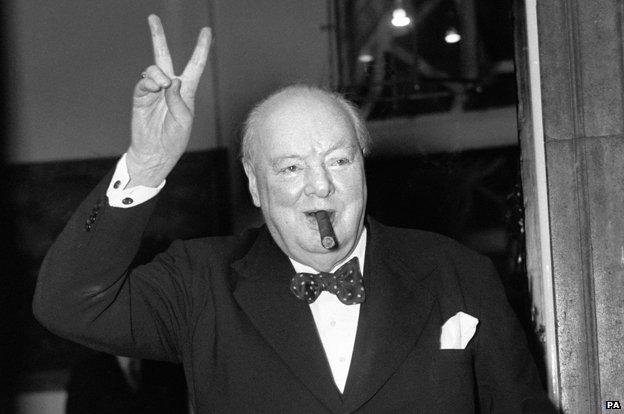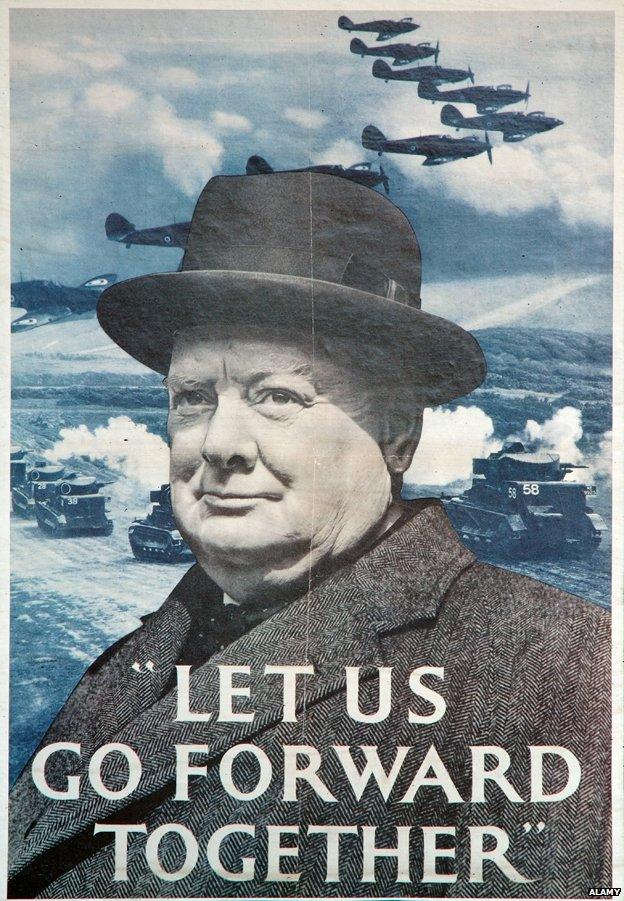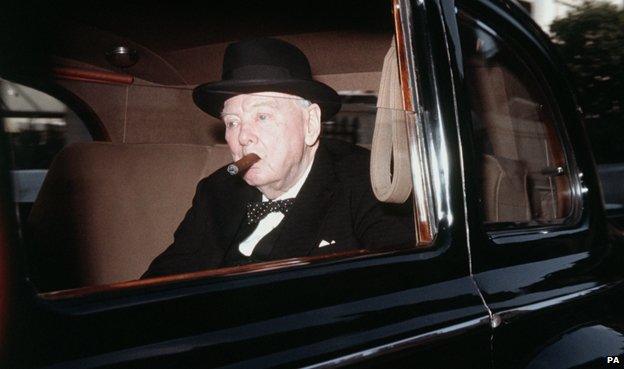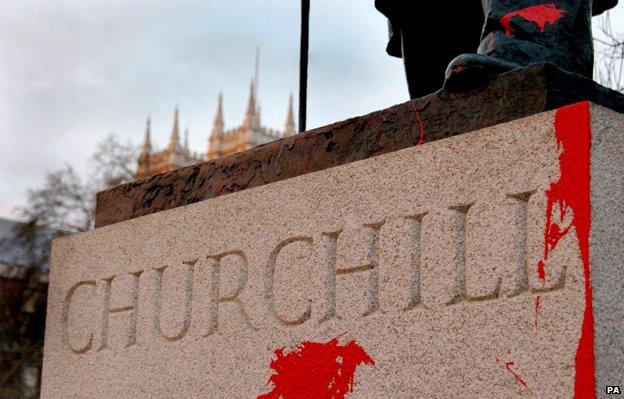Winston Churchill: How a flawed man became a great leader
- Published

On Thursday, the Magazine looked at the greatest controversies of Winston Churchill's career. Here, the BBC's world affairs editor examines how an all-too-human politician became a great wartime prime minister.
In 2002 the BBC broadcast a series called 100 Greatest Britons. After each programme in which particular figures were proposed and examined - they were mostly but not exclusively the usual suspects, such as Darwin, Shakespeare and Elizabeth I - viewers were invited to vote.
In the end, there was no doubt about their verdict - Sir Winston Churchill was the greatest Briton.
The case for him is a powerful one, of course. He was first a government minister in 1908, and occupied most of the top jobs in politics during half a century. He finally retired in 1955, having served as prime minister for a total of nine years.
But it was his extraordinary leadership in World War Two that marked him out. Bold, brave and tireless in his resolve to take on the might of Nazi Germany, he inspired a nervous and hesitant Britain through his sheer energy and force of personality to defy stark odds and never give in.
The entire world's history would have been different if he hadn't come to power in Britain in 1940.
Still, Churchill made huge mistakes in his long political life - Gallipoli, the Black and Tans in Ireland, backing the use of poison gas.
As a particularly inexperienced chancellor of the exchequer in the 1920s, he put Britain back onto the gold standard. John Maynard Keynes, the great economist, believed this was a major factor in bringing about the Great Depression.
In the 1930s, in the political wilderness, he was an angry opponent of Indian nationalism, and his language about Gandhi verged on racism.
He stubbornly supported Edward VIII during the Abdication Crisis of 1936, though he was manifestly unsuited to the job.

There were several major strategic mistakes in WW2.
After it, Churchill was old and ill, yet he returned to lead the government from 1951-55, refusing for a long time to stand down.
It's a powerful litany of failure and misjudgement, and a leading academic at Cambridge University, Dr Nigel Knight, has examined it carefully.
"Churchill was fundamentally flawed. This was shown in his military strategy: Gallipoli in World War 1 was replicated in the Norwegian and North African and 'soft underbelly of Europe' campaigns during World War Two."
Nevertheless at the supreme moment, in May 1940, Churchill got it absolutely right.
During the 1930s he had visited Hitler's Germany and seen for himself the potential for evil there. Few people, either in the UK or the US, wanted to know, and he often had a problem selling his articles about the evils of Nazism to the press.
And of course once he was in power, his superb speeches inspired the country and kept it going.
Boris Johnson, the Conservative mayor of London, who recently published a book about Churchill, believes that it was Churchill's characteristic determination to go and find things out for himself that was a mark of his greatness.
"It's an illusion to think he was just a rhetorician, a guy who skated over the issues. He was deeply immersed in all the detail, and all the technicalities. And that helped him to get the right answer."
In 1938-39 British public opinion, as measured by the polling organisation Mass Observation, was strongly against Neville Chamberlain's policy of appeasement.
But Chamberlain's political position was unassailable, and he forced it through. Even after war had broken out in September 1939 the most likely outcome was that Britain would do a deal with Hitler and stand aside.
However, Chamberlain couldn't keep Churchill out of the Cabinet. He was now back again at the centre of power.

Churchill leaving parliament in 1964 - he remained an MP almost until the end of his life
As Hitler smashed his way through Western Europe, Churchill remained utterly faithful to Chamberlain. He forbade his supporters from leaking hostile stories to the press.
Eventually Chamberlain, his policy in ruins, was obliged to resign. He had no moral alternative but to put Churchill forward as his replacement.
Churchill was a decent and honourable man, as well as a charming one, and it was these qualities, not just his famous defiance, that made him prime minister.
He never actually quite said "History will be kind to me, for I intend to write it", but that turned out to be the case. His historical works were so good, they earned him the Nobel Prize for literature.
No other British prime minister can remotely match the scope of Churchill's achievement. When he died in 1965 the historian Sir Arthur Bryant said: "The age of giants is over."
Bryant was right - and yet that, in a way, is a measure of Churchill's success. Ever since he destroyed Hitler's despotism, our political leaders haven't needed to be giants.
They can just be ordinary.

More from the Magazine

Paint thrown over Churchill's statue in Parliament Square, 2007
The UK is marking the 50th anniversary of the death of Winston Churchill. He is regarded by many as the greatest Briton ever, but for some he remains an intensely controversial figure.
The 10 greatest controversies of Winston Churchill's career (22 January 2015)

Subscribe to the BBC News Magazine's email newsletter to get articles sent to your inbox.